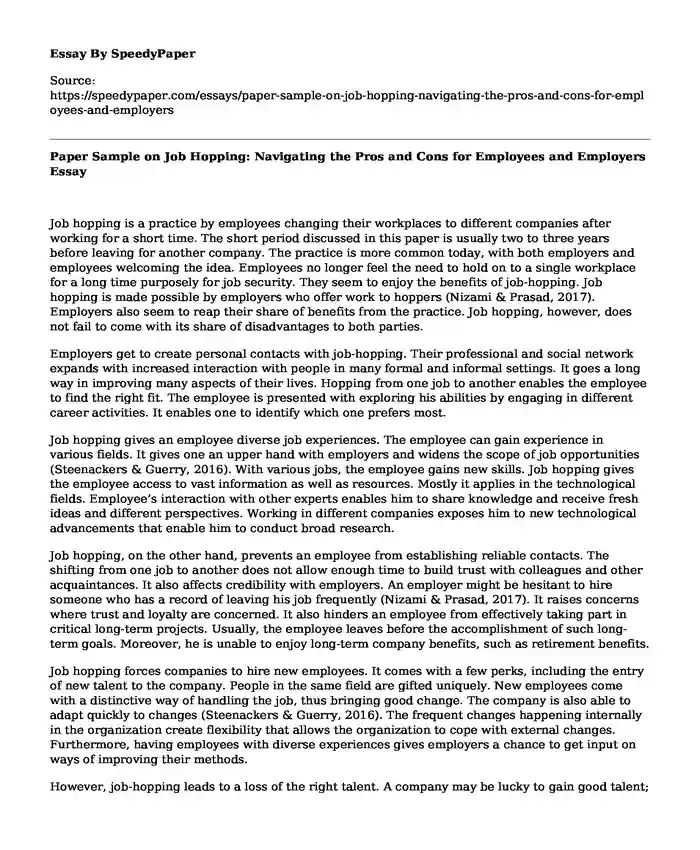
| Type of paper: | Essay |
| Categories: | Company Employment Job |
| Pages: | 3 |
| Wordcount: | 724 words |
Job hopping is a practice by employees changing their workplaces to different companies after working for a short time. The short period discussed in this paper is usually two to three years before leaving for another company. The practice is more common today, with both employers and employees welcoming the idea. Employees no longer feel the need to hold on to a single workplace for a long time purposely for job security. They seem to enjoy the benefits of job-hopping. Job hopping is made possible by employers who offer work to hoppers (Nizami & Prasad, 2017). Employers also seem to reap their share of benefits from the practice. Job hopping, however, does not fail to come with its share of disadvantages to both parties.
Employers get to create personal contacts with job-hopping. Their professional and social network expands with increased interaction with people in many formal and informal settings. It goes a long way in improving many aspects of their lives. Hopping from one job to another enables the employee to find the right fit. The employee is presented with exploring his abilities by engaging in different career activities. It enables one to identify which one prefers most.
Job hopping gives an employee diverse job experiences. The employee can gain experience in various fields. It gives one an upper hand with employers and widens the scope of job opportunities (Steenackers & Guerry, 2016). With various jobs, the employee gains new skills. Job hopping gives the employee access to vast information as well as resources. Mostly it applies in the technological fields. Employee’s interaction with other experts enables him to share knowledge and receive fresh ideas and different perspectives. Working in different companies exposes him to new technological advancements that enable him to conduct broad research.
Job hopping, on the other hand, prevents an employee from establishing reliable contacts. The shifting from one job to another does not allow enough time to build trust with colleagues and other acquaintances. It also affects credibility with employers. An employer might be hesitant to hire someone who has a record of leaving his job frequently (Nizami & Prasad, 2017). It raises concerns where trust and loyalty are concerned. It also hinders an employee from effectively taking part in critical long-term projects. Usually, the employee leaves before the accomplishment of such long-term goals. Moreover, he is unable to enjoy long-term company benefits, such as retirement benefits.
Job hopping forces companies to hire new employees. It comes with a few perks, including the entry of new talent to the company. People in the same field are gifted uniquely. New employees come with a distinctive way of handling the job, thus bringing good change. The company is also able to adapt quickly to changes (Steenackers & Guerry, 2016). The frequent changes happening internally in the organization create flexibility that allows the organization to cope with external changes. Furthermore, having employees with diverse experiences gives employers a chance to get input on ways of improving their methods.
However, job-hopping leads to a loss of the right talent. A company may be lucky to gain good talent; it is nonetheless not impervious to its loss. The company may try to overcome this by offering the right incentives. The decision solely lies in the motivation of the employee. The continuous change of culture and possibly the loss of it may affect the company’s productivity. It takes time for employees to understand, embrace, and act on the organization (Steenackers & Guerry, 2016). Job hopping interferes with this process by limiting the time an employee spends at the job. Besides, job-hopping affects the gross profit with an increase in the amount spent on training and recruiting new employees.
Job hopping is a new culture that is affecting both employees and employers. Like any other change, it has both comforts and discomforts. Some employees opt to remain with a single company and attain their personal goals, such as higher pay and promotions. Most employees prefer to retain their employers as they are deemed loyal and goal-oriented.
References
Nizami, N., & Prasad, N. (2017). Job Hopping, On-the-Job Search, Recruitment Practices, and Decent Work. In Decent Work: Concept, Theory, and Measurement (pp. 145-152). Palgrave Macmillan, Singapore.
Steenackers, K., & Guerry, M.A. (2016). Determinants of job-hopping: an empirical study in Belgium. International Journal of Manpower, 37(3), 494–510. https://doi.org/10.1108/ijm-09-2014-0184
Cite this page
Paper Sample on Job Hopping: Navigating the Pros and Cons for Employees and Employers. (2024, Jan 07). Retrieved from https://speedypaper.com/essays/paper-sample-on-job-hopping-navigating-the-pros-and-cons-for-employees-and-employers
Request Removal
If you are the original author of this essay and no longer wish to have it published on the SpeedyPaper website, please click below to request its removal:
- Look for Professional Mission Statement of a Teacher in our Free Essay
- Essay Sample on Russian Intervention in Syria
- Resume - Free Essay Example
- Free Essay: Resume to Finance Job
- Free Essay. Portfolio for Professionalism in Home Economist Context
- Organizational Behavior: Understanding Complex Human Behavior in a Group Setting - Essay Sample
- Paper on Guidance and Support for President Trump and Mike Pence Presidential Ticket
Popular categories




